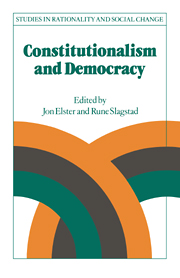Book contents
- Frontmatter
- Contents
- Notes on contributors
- Introduction
- 1 Gag rules or the politics of omission
- 3 Democracy as a contingent outcome of conflicts
- 3 Consequences of constitutional choice: reflections on Tocqueville
- 4 Liberal constitutionalism and its critics: Carl Schmitt and Max Weber
- 5 Democracy and the rule of law: some historical experiences of contradictions in the striving for good government
- 6 Neo-federalism?
- 7 Precommitment and the paradox of democracy
- 8 American constitutionalism and the paradox of private property
- 9 From liberal constitutionalism to corporate pluralism: the conflict over the enabling acts in Norway after the Second World War and the subsequent constitutional development
- 10 Arguments for constitutional choice: reflections on the transition to socialism
- 11 Constitutions and democracies: an epilogue
- Index
8 - American constitutionalism and the paradox of private property
Published online by Cambridge University Press: 05 June 2012
- Frontmatter
- Contents
- Notes on contributors
- Introduction
- 1 Gag rules or the politics of omission
- 3 Democracy as a contingent outcome of conflicts
- 3 Consequences of constitutional choice: reflections on Tocqueville
- 4 Liberal constitutionalism and its critics: Carl Schmitt and Max Weber
- 5 Democracy and the rule of law: some historical experiences of contradictions in the striving for good government
- 6 Neo-federalism?
- 7 Precommitment and the paradox of democracy
- 8 American constitutionalism and the paradox of private property
- 9 From liberal constitutionalism to corporate pluralism: the conflict over the enabling acts in Norway after the Second World War and the subsequent constitutional development
- 10 Arguments for constitutional choice: reflections on the transition to socialism
- 11 Constitutions and democracies: an epilogue
- Index
Summary
Property poses a paradox in the American constitutional system. Private property was for at least 150 years the quintessential instance of individual rights as limits to governmental power. Property set bounds between a protected sphere of individual freedom and the legitimate scope of governmental authority. But the rhetorical power and absoluteness of these bounds has been matched by their shifting permeability in practice. The legal concept of property – a symbol of stability and security – has undergone changes that amount to disintegration. Yet, paradoxically, property seems to retain its symbolic force as the foundation of American freedoms. It is still a central American value and an integral part of our system. But it has lost its traditional constitutional status: private property no longer serves as a boundary between individual rights and governmental power.
The paradox appears in theoretical treatments of property as well. It remains a subject of avid legal commentary, but commentators display a perception of property far different from its traditional meaning as boundary and a comfortable ignorance or disregard of the difference. And at the very time that property has lost its traditional status, it is the focus for the hopes of conservatives, liberals and radicals alike.
A striking number of different advocates of reform have proposed property as the vehicle for change. They want to reconstitute the constitutional meaning of property by tying it to the (related) values they want to promote, such as political participation, privacy and autonomy.
- Type
- Chapter
- Information
- Constitutionalism and Democracy , pp. 241 - 274Publisher: Cambridge University PressPrint publication year: 1988
- 1
- Cited by



